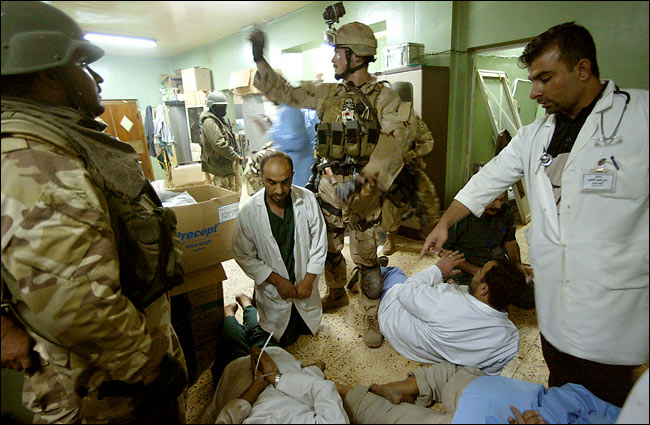http://www.nytimes.com/2004/11/08/international/middleeast/08hospital.html
November 8, 2004
Early Target of Offensive Is a Hospital
By RICHARD A. OPPEL Jr.
FALLUJA, Iraq, Monday, Nov. 8 - The assault against Falluja began here Sunday night as American Special Forces and Iraqi troops burst into Falluja General Hospital and seized it within an hour.
At 10 p.m., Iraqi troops clambered off seven-ton trucks, sprinting with American Special Forces soldiers around the side of the main building of the hospital, considered a refuge for insurgents and a center of propaganda against allied forces, entering the complex to bewildered looks from patients and employees.
Ear-splitting bangs rang out as troops used a gunlike tool called a doorbuster, which uses the force from firing a blank .22-caliber cartridge to thrust forward a chisel to break heavy door locks.
Iraqi troops eagerly kicked the doors in, some not waiting for the locks to break. Patients and hospital employees were rushed out of rooms by armed soldiers and ordered to sit or lie on the floor while troops tied their hands behind their backs.
In less than an hour, the compound was secure. Most of the Iraqis had their cuffs snipped off and were sitting up along hallways in the hospital's main building. Doctors were back to attending to the most seriously ill, watched by Iraqi and American troops. There were broken doors and windows, but little in the way of more severe damage. And there was only one injury: an Iraqi soldier who accidentally discharged his Kalashnikov rifle, injuring his lower leg.
Two companies from the Iraqi 36th Commando Battalion and American Special Forces teams that have been training the Iraqi battalion for the better part of a year joined in the attack on the hospital. The operation was the latest for the 36th Battalion, with men drawn from across the country, including some from Sunni heartland cities like Ramadi and Tikrit where the insurgency is fierce. Iraqis in the unit are eager to demonstrate that they can be a credible fighting force against the insurgents.
But unlike some of their past operations - most notably at a mosque courtyard in Samarra last month where they killed 4 insurgents and apprehended 24 others - the Iraqi special forces met little resistance this time.
A few hundred yards away, an important strategic as well as symbolic battle was playing out: American troops, fighting to secure the western end of the two bridges across the Euphrates River, received intense fire from fortified insurgent positions on the east side of the river. One of the bridges was the scene of the grisly episode on March 31, when Iraqis hung the charred and dismembered bodies of at least two of four American security contractors who had been killed from the bridge's spans.
Both the bridges and the hospital are situated on a peninsula formed by the Euphrates as it flows past downtown Falluja, on the east side of the river - a logical area, American commanders say, for insurgents to fall back if driven from central Falluja.
American officials also say the hospital has been a haven for insurgents in what has been a "no-go" zone for American forces for months. And they have made little secret of their irritation with what they contend are inflated civilian casualty figures that regularly flow from the hospital - propaganda, they believe, for the Falluja insurgents, whom they blame for much of the car bombings, beheadings and other acts of terror in Iraq.
In all, there were 160 Iraqis found at the hospital, according to the American Special Forces commander, and at least five people suspected of being foreign fighters, including one from Syria.
One they can be sure about: A man who identified himself as a fighter from Morocco was wheeled down the hallway, where he pointed out several others he said were also anti-American fighters from other countries.
American troops said they found four or five men at the hospital armed with Kalashnikov rifles, and at least one hand grenade. A poster hanging in an examination room on the first floor displayed scenes of carnage in Iraq and a row of flag-draped American coffins. The writing on the poster encouraged jihad, a translator said.
Perhaps the most intriguing discovery of the night - aside from the Moroccan - were two cellphones found on the roof of the hospital. The Americans said they were clear evidence that someone was monitoring the area in front of the hospital.
"Cellphones work fine on the first floor, if you want to talk to your family," the American Special Forces commander said. "It's pretty clear they were on the roof spotting."
Dr. Rasheed al-Janabi, a general surgeon at the hospital, said many patients had left in the past few weeks in anticipation of an attack, though some, he said, including several wounded by American bombs, were in no shape to leave. "For many days we see on TV that an attack is coming," he said. Only about 30 percent of the Falluja population is left in the city, he said.
He denied that the hospital was a haven for insurgents. "Fighters?" he shrugged. "I don't know about fighters."
One of the Iraqi soldiers, sitting on a desk nearby, voiced skepticism.
"Doctors from around here are afraid of the terrorists," said the soldier, Hassan, who like many of the Iraqi troops was afraid to give his full name. "They're afraid they'll threaten them or shoot them."

Shawn Baldwin for The New York Times
An American Special Forces soldier, center, and an Iraqi soldier, left, trying on Sunday to identify doctors after troops stormed a Falluja hospital.

